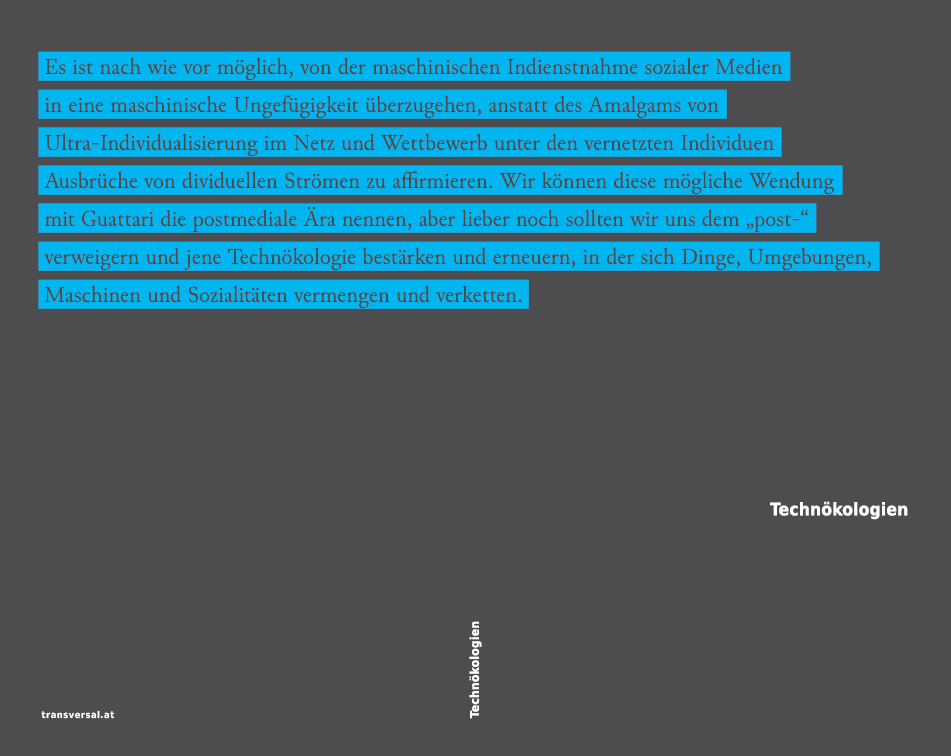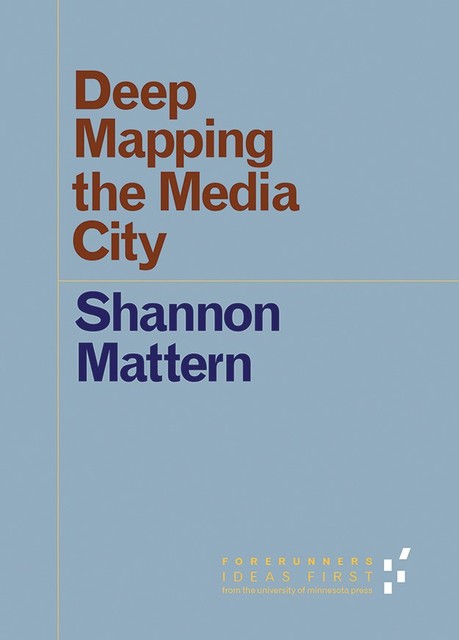Christoph Brunner, Raimund Minichbauer, Kelly Mulvaney, Gerald Raunig (eds.): Technökologien (2018) [German]
Filed under book | Tags: · ecology, environment, media, media archeology, social movements, technology, technopolitics

“Im dividuell-maschinischen Kapitalismus geht Technologie weit über die dichotomen Figuren von Techno-Euphorie (maschinischer Fortschritt in der Hand von Menschen) und Techno-Phobie (Menschen als Instrumente der Maschinen) hinaus. In so unterschiedlichen Feldern wie finanziellen Derivaten und Kryptowährungen, digitalen Schnitten und Data Doubles, biometrischen Filmbildern und sozialen Medien werden Technologien zu Umwelt, Umhüllung, Umgebung.
Mit dem Begriffsvorschlag Technökologien und Beispielen aus der Medienarchäologie der 1990er und 2000er Jahre, vor allem aber anhand der Untersuchung konkreter aktueller Praxen versucht das vorliegende Buch, diesen Verschiebungen gerecht zu werden: In der Mitte der technökologischen Subjektivierung, die nicht selten die Form von Wut, Angst, Hass und Häme annimmt, ergeben sich auch neue Weisen der Affizierung, neue Äußerungsweisen, neue Verhältnissetzungen von Technopolitik und sozialer Bewegung.
Mit Beiträgen von: Christoph Brunner, Marco Deseriis, Katrin M. Kämpf und Christina Rogers, Brigitta Kuster, Stamatia Portanova, Gerald Raunig, Álvaro Ruiz, Raúl Sánchez Cedillo.”
Publisher transversal texts, Vienna, August 2018
Copyleft
ISBN 9783903046214, 3903046213
157 pages
Matthew G. Kirschenbaum: Track Changes: A Literary History of Word Processing (2016)
Filed under book | Tags: · computation, digital humanities, history of literature, history of technology, literary theory, materiality, media archeology, media theory, technology, word processing, writing

“The story of writing in the digital age is every bit as messy as the ink-stained rags that littered the floor of Gutenberg’s print shop or the hot molten lead of the Linotype machine. During the period of the pivotal growth and widespread adoption of word processing as a writing technology, some authors embraced it as a marvel while others decried it as the death of literature. The product of years of archival research and numerous interviews conducted by the author, Track Changes is the first literary history of word processing.
Matthew Kirschenbaum examines how the interests and ideals of creative authorship came to coexist with the computer revolution. Who were the first adopters? What kind of anxieties did they share? Was word processing perceived as just a better typewriter or something more? How did it change our understanding of writing?
Track Changes balances the stories of individual writers with a consideration of how the seemingly ineffable act of writing is always grounded in particular instruments and media, from quills to keyboards. Along the way, we discover the candidates for the first novel written on a word processor, explore the surprisingly varied reasons why writers of both popular and serious literature adopted the technology, trace the spread of new metaphors and ideas from word processing in fiction and poetry, and consider the fate of literary scholarship and memory in an era when the final remnants of authorship may consist of folders on a hard drive or documents in the cloud.”
Publisher Belknap Press of Harvard University Press, 2016
ISBN 9780674417076, 0674417070
xvi+344+[16] pages
via slowrotation
Reviews: Brian Dillon (The Guardian, 2016), Jessica Pressman (ALH Online Reviews, 2016), Eric Banks (Bookforum, 2016), Dylan Hicks (LA Review of Books, 2016), Kirkus Reviews (2016), Francis Russell (Hong Kong Review of Books, 2016), A. Bowdoin Van Riper (PopMatters, 2016), Leann Davis Alspaugh (Hedgehog Review, 2016), Thomas Padilla (American Archivist, 2017), Lai-Tze Fan (Papers of The Bibliographical Society of Canada, 2017), Seth Erickson (Interactions, 2017), David Walden (TUGboat, 2017), Grant Wythoff (Revista Hispánica Moderna, 2018), Elena Spadini (Umanistica Digitale, 2018).
Online companion
Publisher
WorldCat
Shannon Mattern: Deep Mapping the Media City (2015)
Filed under book | Tags: · city, infrastructure, mapping, media, media archeology, networks, urbanism

“Going beyond current scholarship on the “media city” and the “smart city,” Shannon Mattern argues that our global cities have been mediated and intelligent for millennia. Deep Mapping the Media City advocates for urban media archaeology, a multisensory approach to investigating the material history of networked cities. Mattern explores the material assemblages and infrastructures that have shaped the media city by taking archaeology literally—using techniques like excavation and mapping to discover the modern city’s roots in time.”
Publisher University of Minnesota Press, Minneapolis, 2015
Forerunners: Ideas First series, 5
Creative Commons BY-NC-ND 4.0 International License
ISBN 0816698511, 9780816698516
xvi+51 pages
Review: Nicholas Korody (Archinect, 2015).
PDF, PDF
HTML (Manifold edition, 2017, updated on 2019-7-8)

